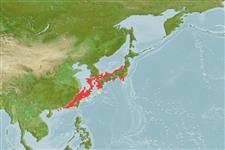Elasmobranchii (sharks and rays) >
Carcharhiniformes (Ground sharks) >
Pentanchidae (Deepwater catsharks)
Etymology: Halaelurus: halos (Gr.), sea; ailouros (Gr.), cat, probably an allusion to the vernacular “catshark,” so named for its cat-like eyes (See ETYFish); buergeri: In honor of German physician-biologist Heinrich Bürger (ca. 1804-1858), who collected and illustrated Japanese flora and fauna and apparently collected holotype of this species (See ETYFish).
Eponymy: Dr Heinrich Bürger (1804/06*-1858) was a German physicist and biologist employed by the Dutch government. [...] (Ref. 128868), visit book page.
More on authors: Müller & Henle.
Environment: milieu / climate zone / depth range / distribution range
Ecology
Marine; demersal; depth range 80 - 100 m. Subtropical; 39°N - 20°N
Northwest Pacific: Japan, Korea, China, and Taiwan (Ref. 244). May also occur in the Philippines (Ref.58048). Collected less than a degree west of the northwestern boundary of the Western Central Pacific (Ref. 11146); may consist of a species complex in the area (Ref. 47737).
Length at first maturity / Size / Weight / Age
Maturity: Lm ?, range 40 - ? cm
Max length : 49.0 cm TL male/unsexed; (Ref. 244)
Found on the continental shelf; sublittoral zone above 100 m (Ref. 11230). Oviparous, but with several egg-capsules retained in the oviduct until the embryos reach an advanced stage before they are laid which might be regarded as being intermediate between oviparity and ovoviviparity. Diet unknown, but presumably dominated by small invertebrates and fishes. Caught irregularly by demersal longline fisheries operating offshore. Utilized for its meat but of limited value due to its small size (Ref.58048).
Life cycle and mating behavior
Maturity | Reproduction | Spawning | Eggs | Fecundity | Larvae
Oviparous, females depositing between 6-12 oval-shaped egg cases (Ref.58048). Eggs are kept in the oviduct until ready to be hatched. Reproductive strategy lies midway between oviparity and ovoviviparity. Species however, is classified as oviparous.
Compagno, L.J.V., 1984. FAO Species Catalogue. Vol. 4. Sharks of the world. An annotated and illustrated catalogue of shark species known to date. Part 2 - Carcharhiniformes. FAO Fish. Synop. 125(4/2):251-655. Rome: FAO. (Ref. 244)
IUCN Red List Status (Ref. 130435: Version 2024-2)
Threat to humans
Harmless
Human uses
Fisheries: of no interest
Tools
Special reports
Download XML
Internet sources
Estimates based on models
Preferred temperature (Ref.
123201): 15.6 - 21.8, mean 17.9 °C (based on 20 cells).
Phylogenetic diversity index (Ref.
82804): PD
50 = 0.5078 [Uniqueness, from 0.5 = low to 2.0 = high].
Bayesian length-weight: a=0.00355 (0.00175 - 0.00721), b=3.08 (2.90 - 3.26), in cm total length, based on LWR estimates for this (Sub)family-body shape (Ref.
93245).
Trophic level (Ref.
69278): 4.3 ±0.5 se; based on size and trophs of closest relatives
Resilience (Ref.
120179): Low, minimum population doubling time 4.5 - 14 years (Fec assumed to be <100).
Fishing Vulnerability (Ref.
59153): Moderate vulnerability (39 of 100).
